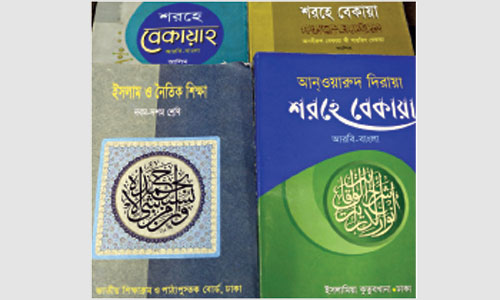Teaching jihad at schools, madrassahs: Textbooks, guidebooks give extremist interpretation
Textbooks and guidebooks for class eight to 12 provide extremist interpretations of Jihad to students of schools and madrassahs.
This has been happening due to the government’s indifference, said academicians as well as Islamic scholars.
Islamic scholar Maulana Fariduddin Masoud said there could no justification to incorporate the topic of Jihad for the students of class eight to 12.
He said Qawmi Madrssahs, which don’t follow the government’s syllabus, teach Jihad as a separate topic to their post graduate students.
He said that Jihad’s extremist interpretations could misguide tender minds of teenage students.
‘Islam O Naitik Shikkha’ (Islam and Moral Education), a textbook for school students of class nine and 10, published by the National Curriculum and Textbook Board says at page 107 that fighting Islam’s enemies is the highest level of Jihad.
Some students of class nine and 10 at nongovernment schools said that the guidebooks they follow for solving creative questions admire Mujahedins as do some of the teachers in their class room lectures.
Professor emeritus Serajul Islam Choudhury said that unless the government keeps a watchful eye on guidebooks, its anti-extremist campaigns among school and madrassah students would be counterproductive.
Islamic Foundation director general Shamim Mohammad Afzal said that the guidebooks’ misinterpretations of Jihad could misguide school and madrassah students.
Shamim said that he had been vocal against the textbooks as well as the curriculum of religious education since 2010.
Shamim and other Islamic scholars said that the textbooks and guidebooks often provide confusing and contradictory messages by incorporating out of context quotations.
Quamrul Islam, a class eight student at a madrssah, said that teachers and guidebooks stray beyond the textbook and unnecessarily broach the issue of Jihad.
Al Fatah Publication’s JSC guidebook on the text of Al Aqaid wal Fiqh (Creed and Jurisprudence) forbids friendship between Muslim and Hindu boys though the textbook itself provides no such lesson.
As no textbooks on Fiqh (jurisprudence), a compulsory subject, is published by the NCTB for madrassah classes 11 and 12, students depend on referral books and guide books published by Islamia Kutub Khana, Al-Baraka Library and Al Fatah Publications, which provide extremists’ interpretation of Jihad.
Islamia Kutubkhana’s referral book Anwarud Diraya: Sharhe Beqaya says at page 397 that Jihad became a must for all the Muslims since they were not winners anywhere.
In the next page, the book prescribes Jihad against the ‘so-called Muslims’ who malign Islam.
Al Fatah publications’ Tanbirul Kefayah fi Sharhe Beqaya, Al Baraka Library’s Sharhe Beqaya (Arabic-Bangla) and Al Islam Publications’ Tadrisul Qefaya fi Sharhe Beqaya on the same subject also provide similar interpretations and prescriptions.
The guidebooks on the same subject published by these publishers says that Jihad became a must against the Anglo-American evil axis as the Mujahidins were doing in Kashmir, Afghanistan, Iraq, Syria and other places.
Asked why their guidebooks and referral books provide such extremist prescriptions, Al Baraka Library owner Nurul Amin and Al Fatah Publications administration manager Quamrul Hasan said that their publications provided practical analysis of the contemporary ground realities.
They admitted that they took no permission from NCTB for printing their referral books.
Islamia Kutubkhana and Al Islam Publications officials refused to take questions.
Teachers of government run Madrasah-e-Alia said they never prescribed these referral and guidebooks to their students.
They said that their students study original Arabic texts authored by seventh century Islamic scholars.
There is a huge demand for referral books and guidebooks as the madrassah students cannot follow class lectures, said Bangla Bazaar based booksellers.
Serajul Islam Choudhury demanded immediate withdrawal of these books in the best interests of the students.
He said crusades and jihads had no relevance for the contemporary states.
NCTB member Moshiuzzaman said dropping Jihad from curriculum would make religious studies incomplete.
He also said crusade is a topic of study for the mainstream grade nine Christian students in Bangladesh.
‘Even then,’ he said, ‘we will review the curriculum and textbooks in the backdrop of the recent rise in militancy in the country’.
He said, Bangladesh Madrasah Education Board will have to bring the necessary changes in Fiqh textbooks as NCTB had no specialist for the subject.
Madrassah board chairman professor AKM Saif Ullah said they would change the definition of Jihad and omit the reference to the caliphs on the issue in the next edition.
‘We will take legal action against private publishers who are misleading pupils by providing extremists’ interpretation of Jihad,’ he said.
Education minister Nurul Islam Nahid took no question on the issue.
News Courtesy: www.newagebd.net











